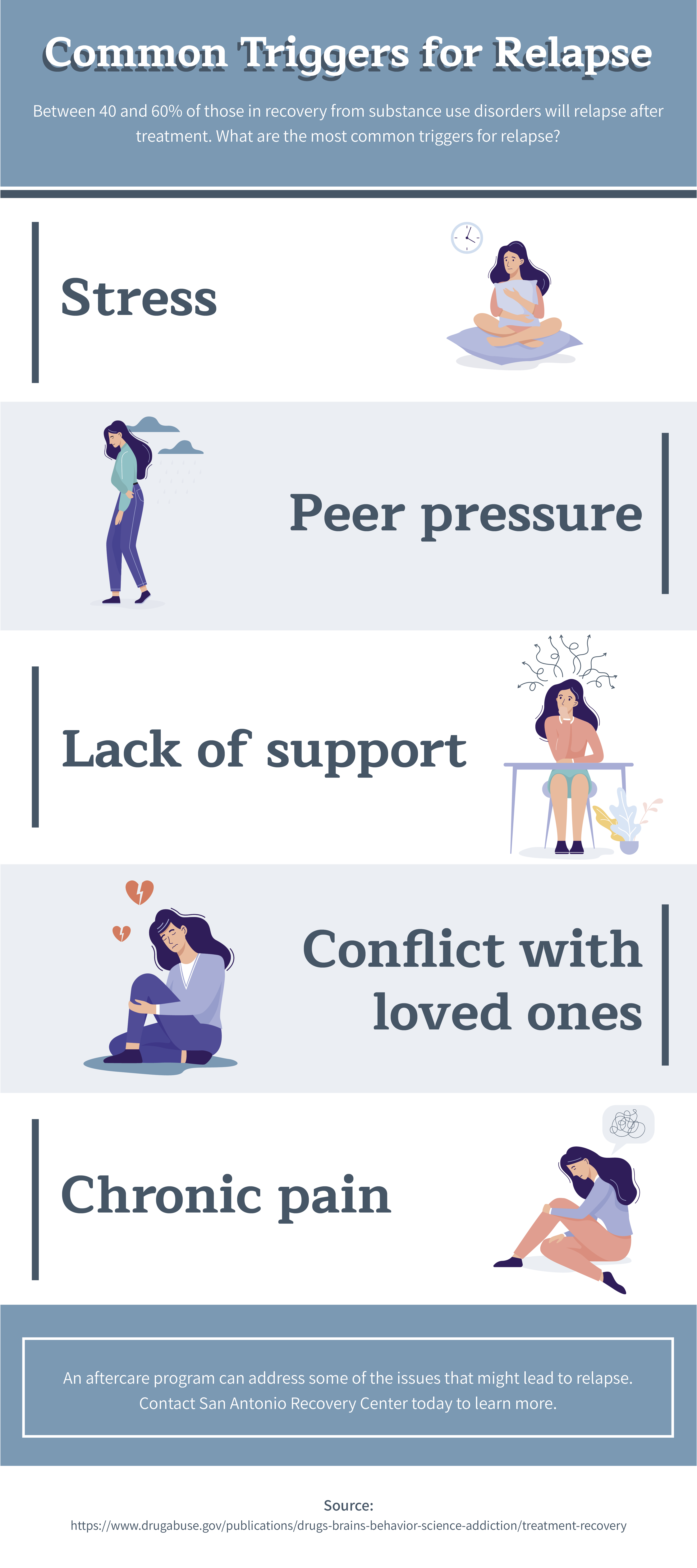Long-term recovery is possible, and we're here to help you make changes that last.
Completing drug and alcohol rehab can feel like a new beginning, especially as those in recovery progress through a formal treatment program. When readying themselves to return to everyday life outside of addiction treatment, our patients often feel a great deal of promise mixed with apprehension. That fear is often the result of knowing that sobriety must be maintained, which can be difficult when returning to home and places associated with memories of drug or alcohol use.
No matter how productive and positive an alcohol and drug addiction treatment program has been, sobriety and other life improvements won’t be sustained if a return to old ways is permitted. This is why the aftercare program from San Antonio Recovery Center is so important to the well-being of our patients in recovery. The aftercare program helps patients return home knowing that the positive changes to mind, body, and spirit attained in treatment can be maintained with the support of our knowledgeable staff. Long-term recovery is possible, and we’re here to help you make changes that last.
Learn more about our aftercare and alumni programs by connecting with San Antonio Recovery Center today at 866.957.7885 or by contacting us online.
Aftercare has to do with ongoing plans to support those in early recovery from drug and alcohol addiction and beyond. Aftercare plans help individuals avoid relapse and work towards their goals with consistent support.
Our aftercare program offers activities, resources, and different interventions which can help those in recovery maintain their sobriety. Triggers like stress and cravings can make relapse seem tempting. However, our personalized aftercare plans promote long-term recovery.
Some of the services and activities that you might participate in as part of an aftercare plan include:
Transitioning back into everyday life can be challenging. Many people relapse after treatment, with some estimates putting the number at 40-60%. The risk of relapse is highest in the first few months after treatment, which is why having an aftercare plan in place right away can lead to positive outcomes. Creating an aftercare plan with the help of our experienced and compassionate team members can prevent a relapse and any ensuing issues. Support is an essential part of these aftercare plans, and that can take the form of support groups, sober housing situations, and even family and friends.

While in drug and alcohol rehab at San Antonio Recovery Center, a vast spectrum of addiction treatment options help those struggling with drug and alcohol addiction recover from their substance abuse. Those on-site methods utilize all of the following:
Through individualized residential programs, clients at San Antonio Recovery Center feel secure and free of many stressors that formerly triggered drug or alcohol use.
When returning home from any substance abuse treatment program, that sense of safety and security can be lifted. Those in recovery from addiction suddenly find themselves back at home in a world that may feel chaotic, confusing, and laden with financial, occupational, social, and family pressure. Without a quality aftercare program, this chaos and stress can lead those in recovery right back to their old routines of substance abuse.
At San Antonio Recovery Center, we provide integrated care and allow each individual to create their own recovery path, which often includes detox and residential treatment. At this point, many people choose to continue with an Intensive Outpatient Program for further support. After any of our treatment programs, aftercare planning helps those in recovery to maintain the coping skills and tools learned in treatment. Through continued care of the aftercare program, those in recovery continue building upon the sober foundation put in place in their weeks of rehabilitation. This program helps clients build and maintain the fulfilling life they want after leaving drug and alcohol rehab.
Even for the most dedicated clients leaving treatment, relapse can occur. However, it can be helpful to reframe your thinking around relapse. Instead of seeing relapse as a sign that your treatment didn’t work or that you will not be successful in recovery, it can be seen as just a challenge on the road to long-term sobriety.
If you or a loved one begins using drugs or alcohol again after a period of sobriety, this is a reason to return to treatment and potentially try a different approach. You might participate in different types of therapy or live in sober living during treatment, where you’ll find a higher level of support.
The potential for relapse is why our aftercare program at San Antonio Recovery Center was developed. We provide valuable support to our clients after rehab to help them remain in recovery and the path toward long-term sobriety.
You might expect aftercare to begin when patients have completed their in-treatment recovery and are ready to transition back to their everyday lives in their home communities. But in actuality, aftercare at San Antonio Recovery Center starts on the very first day of treatment. Why? Because individual aftercare program plans include the identification of necessary skills to keep clients safe from substance abuse in their own home life.
Aftercare continues for an undetermined period of time. As long as those in recovery are committed and work to maintain sobriety, they are technically still participating in aftercare. Some aspects of the aftercare program include 12-step meetings, alumni gatherings, volunteerism, and other activities supportive of recovery. These and other aftercare initiatives help those in recovery remain connected to their peer groups and community for personal support among those who share similar healthy, engaged, and sober life values.

Why do so many individuals in recovery relapse? There are a number of factors that can contribute to high relapse rates. Ongoing, systemic issues can contribute to these challenges. It can be difficult to find a job after a period of time out of work, or some of those in recovery might face difficulty finding housing that is safe and supportive. Some individuals have legal issues that need to be overcome after treatment or other financial problems. One way that aftercare programs can provide support is by giving patients access to helpful community resources. These resources might include:
Aftercare involves less intervention from doctors and more support from the community. One of the goals of early recovery is getting to a place in life that is supportive of sobriety, and aftercare programs can help.
Sober living homes provide those in recovery with a safe, supportive, and drug-and-alcohol-free living situation during treatment and beyond. In sober living homes, residents commit to sobriety and participate in 12-step meetings or ongoing therapy sessions.
We offer sober living homes for our patients while they are in treatment and beyond. These living situations can help our patients as they transition back to work and other responsibilities in their everyday lives. Going straight from residential treatment to daily life can be challenging, but sober living offers a gradual approach to independence.
Many individuals in recovery benefit from participating in ongoing therapy sessions even after finishing a formal treatment program. These therapy sessions might take place in a recovery center or with a private therapist and can take the form of group or individual therapy sessions.
Some of the types of therapy that can be most effective for addiction treatment include:
No matter the type of therapy you participate in, regular sessions can help you maintain your commitment to sobriety.
12-step programs such as Alcoholics Anonymous are a widely available, low-cost option for ongoing treatment. These meetings are held in locations all over the country and are open to anyone who wants to join. At San Antonio Recovery Center, our treatment programs are founded on the principles of the 12 steps. These foundational principles include:
During your time in our treatment center, you’ll participate in 12-step meetings and will learn about each of the steps. Continuing to attend meetings in recovery can help you maintain your sobriety as you give back to your community.
As an individual in recovery, getting to aftercare can sound like a dream if you are still within the grasp of addiction. It’s not a dream. Aftercare starts upon admission to treatment, which is when hope for a renewed, sober, and happy life begins. The key is to get started today. Begin the journey to recovery in our supportive addiction treatment center and take back your life from the dangers of addiction.
In addition to our aftercare program, we offer:
Reach out to San Antonio Recovery Center today at 866-957-7885 or connect with us online to discuss treatment in our affordable rehabilitative environment in San Antonio.
contact us now!
